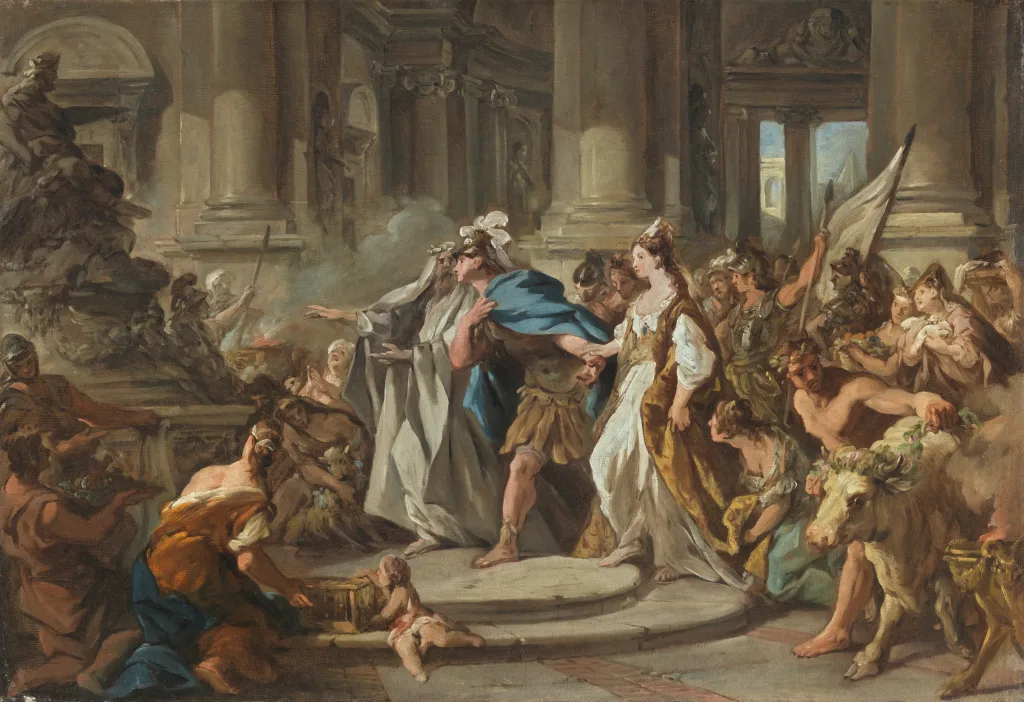Medea, the tragic heroine of Euripides’ play, is a complex and intriguing character. Her decision to kill her own children is a chilling and shocking act, but it is rooted in a deep sense of betrayal and a desire for revenge.
Medea is initially portrayed as a woman consumed by intense emotions. She is deeply hurt and angered by Jason’s betrayal, as he abandons her for another woman. This emotional turmoil is often associated with femininity, suggesting that Medea’s actions are driven by her gender. However, it is important to note that her reaction is not solely based on her gender, but rather on her personal experiences and the injustices she has endured.
Medea’s hatred towards Jason is evident throughout the play. She feels betrayed and abandoned, and her rage consumes her. This intense hatred fuels her desire for revenge, and she sees killing her children as the ultimate act of retribution. By taking away what Jason loves most, she believes she will inflict the greatest pain upon him.
Despite her deep anger and desire for revenge, Medea experiences moments of regret and inner conflict. She acknowledges the love she has for her children and the pain she will endure by killing them. In one poignant moment, she expresses her love for them, stating, “Oh, how I love these hands, how I love these mouths, the way the children stand, their noble faces!” (1094-95). This demonstrates that, despite her vengeful intentions, Medea is still capable of feeling love and experiencing conflicting emotions.
Medea’s decision to kill her children is motivated by her desire to destroy her memories of Jason and the symbol of love between them. Once Jason broke his promise and deserted her, the symbol of their love was shattered, rendering the children meaningless to Medea. In her twisted logic, killing them becomes a way to sever all ties with Jason and rid herself of the pain he has caused.
It is crucial to understand that Medea’s actions are not justified or condoned. The killing of her children is a horrific act, and the play does not attempt to justify or excuse it. However, by delving into Medea’s motivations and emotions, we gain a deeper understanding of the complex factors that drive her to commit such a heinous act.
Medea’s decision to kill her children is a result of her deep sense of betrayal, intense hatred towards Jason, and desire for revenge. While her actions may be influenced by traditional gender roles and expectations, it is important to recognize that her motivations are rooted in her personal experiences and the injustices she has endured. The play leaves us with a haunting and unsettling portrayal of a woman driven to extreme measures by her emotions and desire for vengeance.
Did Medea Regret Killing Her Children?
According to the ancient Greek tragedy “Medea” written by Euripides, Medea does exhibit regret when contemplating killing her children. In the play, Medea’s intense emotions, including anger and hatred towards her husband Jason, drive her to commit heinous acts, including the murder of her own offspring. However, amidst her vengeful and destructive actions, Medea experiences a moment of internal conflict and sorrow.
It is important to note that Medea’s regret is not depicted as a result of remorse for the act itself, but rather stems from the emotional bond she shares with her children. As a mother, Medea is torn between her love for her offspring and her desire for revenge against Jason, who has betrayed her. The conflict arises when she realizes the irreversible consequences of her actions and contemplates the loss she will suffer by killing her own flesh and blood.
In the play, Medea has a moment of hesitation, questioning whether she can go through with the murder of her children. She expresses her internal struggle, acknowledging the pain and sorrow that will accompany such an act. This remorse is seen as a reflection of her femininity and maternal instincts, highlighting the complex and conflicting emotions she experiences.
While Medea does exhibit regret when contemplating killing her children, it is important to recognize that this regret arises from her emotional connection as a mother rather than a moral objection to the act itself. The portrayal of Medea’s regret underscores the complexity of her character and the depth of her emotions within the context of the tragedy.

What Is Medea’s Rationale For Killing The Children?
Medea’s rationale for killing her children stems from her desire to destroy her memories of Jason and the symbol of love they once shared. After Jason broke his promise to Medea and abandoned their marriage for another woman, their bond was shattered. This meant that the children, who were a physical representation of their love, no longer served any purpose to Medea. In her mind, killing them would not only be a form of revenge against Jason, but also a way to eradicate any reminders of their failed relationship.
Medea’s decision to kill her children was driven by a mix of emotions, including anger, betrayal, and a desire to regain control over her own life. By eliminating her children, she believed that she could sever all ties with Jason and start anew. It was a drastic and horrifying act, but in Medea’s mind, it was the only way to rid herself of the pain and heartbreak associated with her failed marriage.
It is important to note that Medea’s rationale for killing her children is deeply rooted in the context of Greek tragedy, where characters often make extreme choices in response to their circumstances. Medea’s actions may seem unfathomable and shocking to us today, but within the framework of the play, they serve as a powerful exploration of the consequences of betrayal and the lengths to which one might go to seek justice or revenge.
Medea’s rationale for killing her children is driven by her desire to destroy her memories of Jason and the symbol of love between them. By eliminating her children, she believed she could sever all ties with Jason and move on from their failed relationship. Her decision was fueled by a mix of emotions, including anger, betrayal, and a desire for control. While her actions may be difficult to comprehend, they serve as a powerful representation of the tragic consequences of betrayal in Greek tragedy.
Did Medea Kill Her Sons?
Medea killed her sons. In the play, “Medea” by Euripides, Medea’s actions are driven by her intense anger and desire for revenge against her husband, Jason. Jason had abandoned Medea and their two sons to marry the daughter of King Creon of Corinth.
In her quest for vengeance, Medea hatches a plan to kill both Creon and his daughter. She sends a poisoned robe and crown as a gift to the princess, which ultimately leads to her death. Upon hearing the news of her daughter’s demise, Creon rushes to her aid and is also killed by the poisoned garments.
However, Medea’s most horrifying act is yet to come. In her despair and determination to make Jason suffer, she decides to kill their two sons. She does this to inflict the maximum amount of pain and suffering upon Jason, as she knows that he loves their children deeply.
Medea lures the boys into her house, promising them protection and safety. However, she then proceeds to murder them, using a sword. This act is seen as an ultimate betrayal of a mother’s love for her children.
The play portrays Medea’s actions as a manifestation of her extreme emotional state and her desire for revenge. It explores the darker aspects of human nature and the lengths one can go to when consumed by anger and bitterness.
Medea did indeed kill her sons as a part of her plan for revenge against Jason.
Did Medea Ever Love Her Children?
Medea’s love for her children is a complex and contradictory aspect of her character. At times, she exhibits an overwhelming and genuine affection for them, while at other times, her actions suggest a lack of maternal love. It is essential to examine the various instances in the play where Medea’s love for her children is portrayed.
1. Unconditional Love: Medea’s initial portrayal reflects a deep and unconditional love for her children. She expresses her affectionate bond with them, emphasizing her love through her words and actions. Medea’s genuine emotions are evident in her statement, “Oh, how I love these hands, how I love these mouths, the way the children stand, their noble faces!” (1094-95). This demonstrates her immense love and admiration for her children.
2. Sacrifices and Protection: Medea’s love for her children is further evident in her willingness to sacrifice and protect them. She goes to great lengths to ensure their safety, even resorting to extreme measures. For instance, she kills her brother and deceives her husband, Jason, to secure her children’s future. This displays her unwavering commitment to safeguarding her offspring.
3. Emotional Turmoil: Despite her deep love, Medea’s emotions are tumultuous and conflicted. She simultaneously experiences intense maternal affection and resentment towards her children due to the pain inflicted upon her by Jason’s betrayal. Medea’s internal struggle is highlighted when she contemplates killing her children, acknowledging the immense pain she will endure: “My heart, my heart, will break, but then they will learn the evil they have done” (1266-67). This suggests that her love for her children is entangled with her desire for revenge.
4. Final Act of Betrayal: Ultimately, Medea’s love for her children becomes distorted in her final act of killing them. While this act may seem contradictory to her earlier expressions of love, it can be understood as an extreme manifestation of her desire to hurt Jason. By murdering their children, Medea ensures that Jason will experience the same pain and loss that she has endured.
Medea’s love for her children is a complex and multifaceted aspect of her character. While she undoubtedly loves them deeply, her intense emotions, coupled with her desire for revenge, lead her to commit the unthinkable act of killing them. This demonstrates that Medea’s love for her children is ultimately overshadowed by her overwhelming rage and desire for vengeance.

Conclusion
Medea is a complex and multifaceted character who defies traditional gender roles and expectations. She challenges the notion of womanhood by exhibiting traits typically associated with men, such as her intelligence, cunning, and ability to exact revenge. At the same time, she also displays deep emotions and maternal love, highlighting the complexity of human nature.
Medea’s actions, although driven by her intense hatred for Jason, also stem from a place of immense pain and betrayal. She is a woman scorned and seeks to destroy everything that reminds her of her failed marriage and shattered love. Her decision to kill her own children, while shocking and horrific, is a desperate attempt to erase the memories of her love for Jason and the symbol of their once happy family.
The play, set in the backdrop of Corinth, showcases the power dynamics and societal expectations of the time. Medea’s actions challenge these norms, highlighting the limitations and injustices imposed upon women. Her ultimate act of infanticide serves as a poignant commentary on the sacrifices and sufferings endured by women in a patriarchal society.
Medea is a tragic figure who embodies both the strength and vulnerability of women. She defies easy categorization, forcing us to confront our own biases and preconceived notions about gender roles and expectations. Through her harrowing journey, Medea leaves a lasting impact on audiences, provoking deep reflection on the complexities of human nature and the consequences of unchecked emotions.
